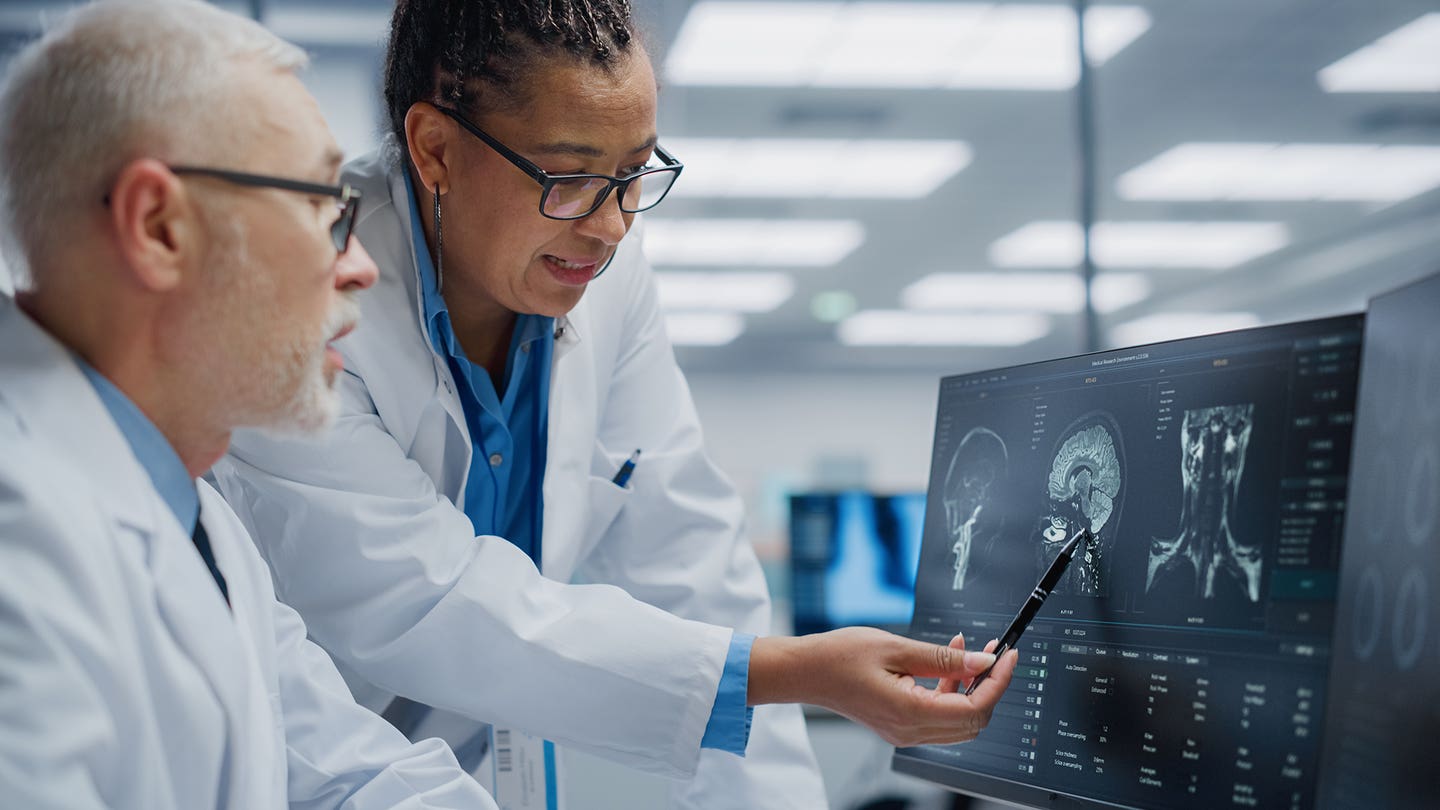Brain hormone Leptin may cure type 1 diabetes without insulin
New research shows that leptin and the brain play a powerful role in controlling type 1 diabetes, offering hope for insulin-free treatment.

Human trials may lead to a breakthrough therapy for type 1 diabetes focused on the brain, not just insulin. (CREDIT: gorodenkoff/Getty Images)
For more than a hundred years, insulin has been the key to controlling type 1 diabetes. It has saved lives by preventing diabetic ketoacidosis (DKA), a life-threatening condition that happens when the body can’t use glucose and instead breaks down fat, causing acid to build up in the blood.
But now, scientists are learning that the brain—not just insulin—plays a much bigger role in this process than anyone expected.
A breakthrough beyond insulin
It all started in 2011 with a strange experiment. Researchers at the University of Washington infused leptin, a hormone made by fat cells, into the brains of rats and mice with type 1 diabetes. These animals had very little insulin, yet within days, their blood sugar and ketone levels returned to normal. Even more surprising: their levels stayed stable.
Dr. Michael Schwartz, lead author and professor of medicine at UW, remembers his amazement. “The blood sugars just didn’t come down, but the levels stayed down,” he said. “If you tried to get them to rise, they came back down. If you tried to lower them, they came back up.”
At the time, few believed what they saw. The idea that diabetic ketoacidosis could be reversed without insulin went against everything doctors had been taught.
But today, new research published in The Journal of Clinical Investigation lays out how leptin interacts with the brain—and why this discovery could reshape treatment for type 1 diabetes.
Related Stories
- FDA approved psoriasis drug could prevent Type 1 diabetes, study finds
- Painless saliva insulin test offers early signs of diabetes and obesity risk
- Diabetes drug Semaglutide might protect the brain from dementia
How the brain senses fuel shortages
Leptin has one main job: to tell your brain how much fuel your body has stored. The hormone travels through your blood to the hypothalamus, a part of the brain that helps regulate hunger, metabolism, and energy balance. When leptin levels drop—as they do in type 1 diabetes—the brain gets the signal that the body is starving, even if it’s not.
In response, the brain triggers a full-body reaction to release energy. It sends nerve signals and hormones like cortisol and glucagon to your liver, fat stores, and pancreas. The liver makes more glucose and ketones. Fat cells release fatty acids. All of this mobilizes fuel to keep the body running.
But without insulin to act as a brake, this process spins out of control. That’s when DKA begins.
Fuel overload with no brakes
When the pancreas stops making insulin, blood sugar levels rise. At the same time, leptin levels drop, which tells the brain to start a frantic fuel-releasing process. The liver pours glucose and ketones into the blood. Fat tissue breaks down. You eat more, even though your body already has too much fuel circulating. This mismatch creates a crisis.
“Leptin deficiency is a key driver of this overreaction,” Schwartz explained. “It signals the brain to activate emergency pathways for fuel release, even though it’s not necessary.”
As glucose and ketones build up in the blood, they begin to dehydrate the body. This makes it harder for the kidneys to flush out sugar. Acids accumulate, and the brain responds to the stress by releasing even more hormones like epinephrine. The cycle worsens. Eventually, the condition turns into full-blown DKA.
Rethinking DKA: It starts in the brain
Until recently, DKA was believed to result entirely from insulin deficiency. But Schwartz and his team now argue that’s only part of the story.
They propose a new idea: that the brain’s faulty perception of fuel shortage, triggered by low leptin, drives the crisis. And more importantly, if the brain could be convinced that the body has enough energy, it could stop the dangerous reaction.
In rodents, delivering leptin directly into the brain reversed DKA—even without insulin.
“The finding that leptin can normalize blood sugar and ketone levels has huge implications,” said co-author Dr. Irl Hirsch, who also teaches at the University of Washington and has lived with type 1 diabetes since childhood.
“This might be a better way,” Hirsch said. “Insulin was one of the greatest discoveries of the last century. But this, this is the next step.”
Targeting the brain to stop DKA
The research team believes that leptin acts on specific neurons in the brain’s energy control centers. One area, called the ventromedial nucleus (VMN), has high levels of leptin receptors. Injecting a tiny amount of leptin directly into the VMN reverses the metabolic chaos caused by insulin deficiency.
In another part of the brainstem, the parabrachial nucleus (PBN), leptin dampens the signals that drive the liver to make ketones. In fact, leptin’s effects on blood sugar and ketones seem to happen through different brain circuits.
This layered control system may explain why leptin therapy has such wide-ranging effects in diabetic rodents.
“If you can shut down the brain’s overreaction,” Schwartz said, “you can break the vicious cycle that causes DKA.”
Human trials could change treatment forever
So far, leptin therapy has only been tested in rodents. But Schwartz now plans to seek FDA approval to begin human trials. The hope is that leptin—or a drug that mimics its action—can help people with type 1 diabetes keep their blood sugar under control without relying solely on insulin.
“I think if you could treat type 1 diabetes without daily insulin injections and blood sugar monitoring, patients would say that is the greatest thing ever,” Schwartz said.
Hirsch agrees, noting that such a therapy would greatly ease the daily burden on patients and their families. It could also reduce the risk of life-threatening complications like DKA.
“We now have a much better understanding of a finding that was largely ignored by the scientific community when it was first reported in 2011,” Schwartz added.
If successful, the therapy could shift how doctors view diabetes—from a hormone replacement problem to a brain-based fuel management issue.
Crossing into the brain safely
Right now, getting leptin into the brain requires invasive delivery. But scientists are working on new methods to move drugs across the blood-brain barrier safely. If those advances continue, it could soon be possible to deliver leptin without surgery or injections into the brain.
Even restoring leptin to normal blood levels helps reduce ketones, though not blood sugar. This suggests that stronger or better-targeted delivery methods may be needed to get the full effect in humans.
But the vision is clear: control type 1 diabetes not just by replacing insulin, but by reprogramming how the brain handles energy.
A paradigm shift in diabetes care
For decades, diabetes care has centered on insulin. That focus saved millions of lives. But this new framework challenges the idea that insulin is the only player. It highlights how the brain’s misreading of energy stores—triggered by low leptin—can lead to disaster.
And it opens the door to new treatments that could be more effective and less invasive.
“This is one of the most exciting discoveries of my career,” Hirsch said.
If future studies in humans succeed, leptin may become a powerful new tool in managing type 1 diabetes—one that changes the brain’s view of hunger, energy, and balance.
What are the warning signs of DKA?
Diabetic ketoacidosis (DKA) typically progresses gradually, but if vomiting begins, the condition can escalate to a life-threatening emergency within hours. Watch for these early warning signs:
- Thirst or a very dry mouth
- Frequent urination
- High blood glucose (blood sugar) levels
- High levels of ketones in the urine
Then, other symptoms appear:
- Constantly feeling tired
- Dry or flushed skin
- Nausea, vomiting, or abdominal pain. Vomiting can be caused by many illnesses, not just ketoacidosis. If vomiting continues for more than two hours, contact your health care provider.
- Difficulty breathing
- Fruity odor on breath
- A hard time paying attention, or confusion
Always consult your doctor or other qualified healthcare provider with any questions you may have regarding a medical condition, procedure, or treatment, whether it is a prescription medication, over-the-counter drug, vitamin, supplement, or herbal alternative.
Note: The article above provided above by The Brighter Side of News.
Like these kind of feel good stories? Get The Brighter Side of News' newsletter.



